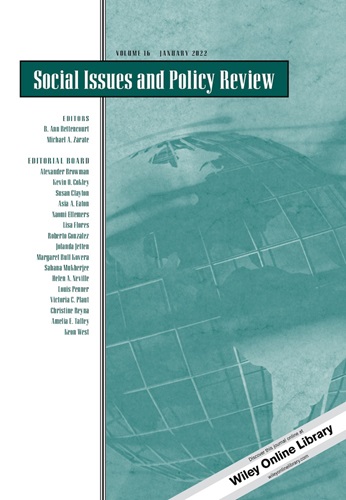Elegant Science Narratives and Unintended Influences: An Agenda for the Science of Science Communication
IF 5.6
1区 心理学
Q1 PSYCHOLOGY, SOCIAL
引用次数: 9
Abstract
Scientists must share their work with the public in order to promote science-based public discourse and policies. These acts of science communication are often evaluated in terms of their ability to inform (i.e., introduce accurate and accessible information) and engage (i.e., capture interest and maintain attention). We focus on a third basis by which science communication might be judged, influence. Science communicators exert influence when they shape public opinions in ways that affect their judgments and decisions, alter social and political discourse and debate, and guide social policy. We describe how the influence of any given science communication should be evaluated independent of its ability to inform or engage. We give particular attention in our analysis to the often unintended influences that well-meaning science communicators can have. We begin by considering ways that communications from climate scientists might reduce support for climate regulation and communications from health scientists might undermine public health. We then develop two “case studies,” drawn from social psychology. These show how popular media descriptions of the science of racial bias and disadvantage might in some cases exacerbate racial discrimination and reduce concern for the disadvantaged. We close with an agenda for a more vigorous science of science communication; one that engages in two complementary pursuits. Critical studies identify the dominant and consequential effects that popular science communicators are having on public perceptions. Strategic studies advance and empirically优雅的科学叙事与意想不到的影响:科学传播科学议程
科学家必须与公众分享他们的工作,以促进基于科学的公共话语和政策。这些科学传播行为通常根据其告知(即介绍准确和可获取的信息)和参与(即吸引兴趣和保持注意力)的能力进行评估。我们关注第三个评判科学传播的基础,影响力。当科学传播者以影响其判断和决策、改变社会和政治话语和辩论以及指导社会政策的方式塑造公众舆论时,他们就会发挥影响力。我们描述了如何独立于其告知或参与的能力来评估任何特定科学传播的影响。我们在分析中特别注意善意的科学传播者可能产生的往往意想不到的影响。我们首先考虑气候科学家的沟通可能会减少对气候监管的支持,而卫生科学家的沟通则可能会破坏公众健康。然后,我们发展了两个“案例研究”,从社会心理学中提取。这些表明,在某些情况下,流行媒体对种族偏见和劣势科学的描述可能会加剧种族歧视,减少对弱势群体的关注。最后,我们提出了一个更有力的科学传播科学议程;从事两种互补追求的人。批判性研究确定了科普传播者对公众认知的主导和间接影响。战略研究的进展和经验
本文章由计算机程序翻译,如有差异,请以英文原文为准。
求助全文
约1分钟内获得全文
求助全文
来源期刊

Social Issues and Policy Review
Multiple-
CiteScore
22.20
自引率
1.10%
发文量
9
期刊介绍:
The mission of Social Issues and Policy Review (SIPR) is to provide state of the art and timely theoretical and empirical reviews of topics and programs of research that are directly relevant to understanding and addressing social issues and public policy.Papers will be accessible and relevant to a broad audience and will normally be based on a program of research. Works in SIPR will represent perspectives directly relevant to the psychological study of social issues and public policy. Contributions are expected to be review papers that present a strong scholarly foundation and consider how research and theory can inform social issues and policy or articulate the implication of social issues and public policy for theory and research.
 求助内容:
求助内容: 应助结果提醒方式:
应助结果提醒方式:


